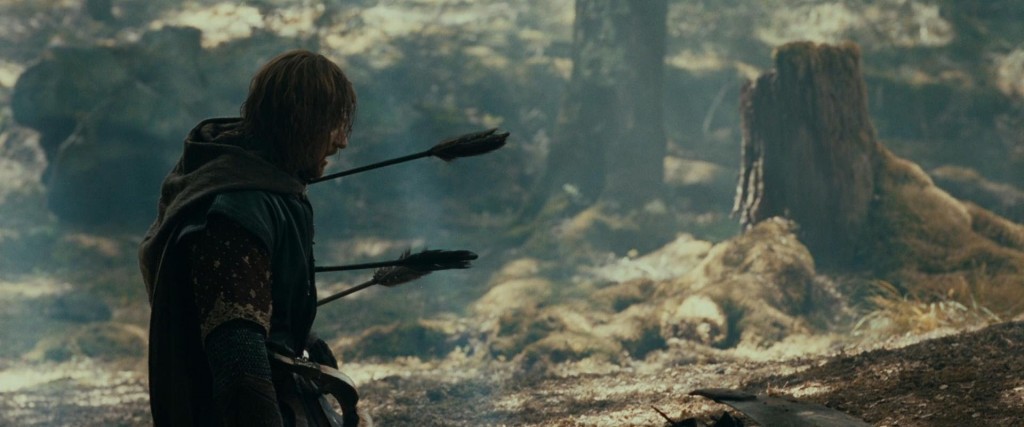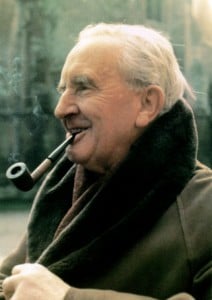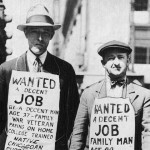Posts about the atomic bombings of Hiroshima and Nagasaki normally make their rounds in early August, but I couldn’t resist posting this today. It’s a letter from J.R.R. Tolkien to his son, Christopher, dated 9 August 1945, the day the U.S. dropped the second atomic bomb on Japan. Together, the bombs killed over 200,000 people: 120,000 in Hiroshima, 80,000 in Nagasaki, and these are conservative estimates. I’ll leave it to you, dear reader, to decide which of Tolkien’s characters the U.S. more closely resembled on that day, the hobbits of the Shire, or Sauron, the Lord of the Rings. Here’s the letter:
The news today about ‘Atomic bombs’ is so horrifying one is stunned. The utter folly of these lunatic physicists to consent to do such work for war-purposes: calmly plotting the destruction of the world! Such explosives in men’s hands, while their moral and intellectual status is declining, is about as useful as giving out firearms to all inmates of a gaol and then saying you hope ‘this will ensure peace’. But one good thing may arise out of it, I suppose, if the write-ups are not overheated: Japan ought to cave in. Well we’re in God’s hands. But He does not look kindly on Babel-builders.
The U.S. government’s stockpile of weapons of mass destruction, and its meddling foreign policy, reminds me of this conversation between Frodo and Gandalf:
“But I have so little of any of these things [strength, heart, wits]! You are wise and powerful. Will you not take the Ring?”
“No!” cried Gandalf, springing to his feet. “With that power I should have power too great and terrible. And over me the Ring would gain a power still greater and more deadly.” His eyes flashed and his face was lit as by a fire within. “Do not tempt me! For I do not wish to become like the Dark Lord himself. Yet the way of the Ring to my heart is by pity, pity for weakness and the desire of strength to do good. Do not tempt me! I dare not take it[.]”
Spreading democracy around the world has a funny way of destroying it here at home. Torture, detainment without trial, surveillance, militarization — these things which began as elements of U.S. foreign policy are now a part of life here in the States. Violence, like the Ring, is never satisfied. Like the Ring, it is a paradox. Frodo was equipped to carry the Ring precisely because he would not use it (tempted though he was). “But why,” as G.K. Chesterton’s mathematician from the moon might ask, “should something exist if it’s not going to be used? What sense does that make?” Boromir wondered the same thing, “Why should we not think that the Great Ring has come into our hands to serve us in the very hour of need?” “It is a gift,” he would later protest. Elrond said to him in reply, “Its strength, Boromir, is too great for anyone to wield at will, save only those who have already a great power of their own. But for them it holds an even deadlier peril. The very desire of it corrupts the heart. Consider Saruman. If any of the Wise should with this Ring overthrow the Lord of Mordor, using his own arts, he would then set himself on Sauron’s throne, and yet another Dark Lord would appear.” How I have grown to love Boromir, that most human of literary figures.

This, I reckon, is the logic of the cross. “For the message about the cross is foolishness to those who are perishing [Eugene Peterson says, “hell-bent on destruction”], but to us who are being saved it is the power of God. For it is written, ‘I will destroy the wisdom of the wise, and I will thwart the cleverness of the intelligent’ (1 Corinthians 1:18-21).” Taking the Ring to Mount Doom did seem foolish to Boromir. “Let the Ring be your weapon, if it has such power as you say. Take it and go forth to victory!” he proclaimed at the Council of Elrond. But, as Frodo said to Boromir near the Falls of Rauros, after the Steward of Gondor offered the hobbit advice, “I think I already know what counsel you would give, Boromir, and it would seem like wisdom but for the warning in my heart.” As a matter of pastoral guidance, it may be helpful to ask if there are any Rings of Power which tempt us in our own lives? What behaviors and responses seem, on the surface, empowering, but in the long rung, drain us of life energy and draw us ever deeper into destructive cycles and patterns? I believe the victory of Jesus on the cross calls us out of those patterns, to throw the Ring into the fires of Mount Doom. This applies both to individuals and to nations.
I asked at the outset whether the U.S. more closely resembles hobbits or Sauron, but the truth is we are the race of Men, of kin with Boromir, and with Isildur before him. This is the paradox of violence, in families, in relationships, and among nations: it makes us feel strong, but we are never in control; it makes us feel righteous, but we become what we hate; it makes us feel separate and above, but slowly we are being pulled in. Sometimes, we use violence (physical and emotional) out of fear, to avoid some unpleasant and imagined future, but often it is our use of violence (even violence against ourselves in the form of spiritual or emotional neglect) that makes that future into reality. It is, to be sure, the Great Deceiver. And it is our lot, as humans, to be tempted by it. But take heart, as Gandalf notes:
Let folly be our cloak, a veil before the eyes of the Enemy! For he is very wise, and weighs all things to a nicety in the scale of his malice. But the only measure that he knows is desire, desire for power; and so he judges all hearts. Into his heart the thought will not enter that any will refuse it, that having the Ring we may seek to destroy it. If we seek this, we shall put him out of reckoning.













